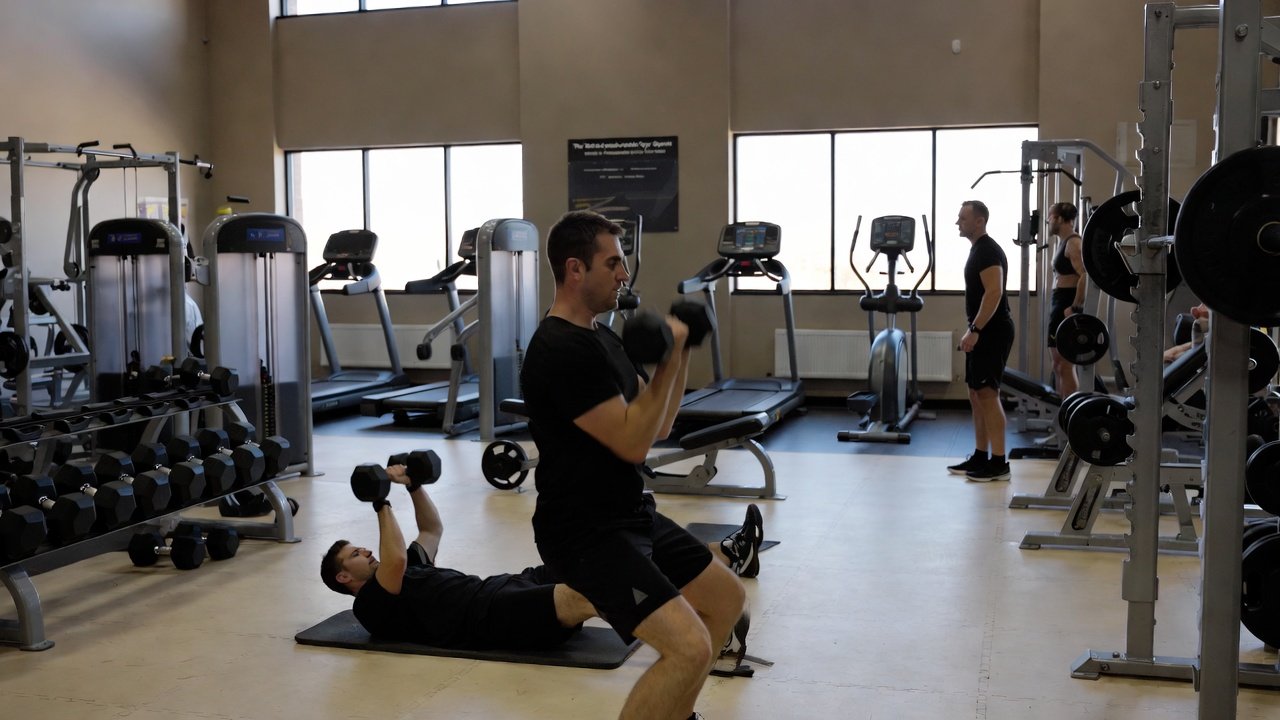Introduction to Common Fitness Mistakes
Embarking on a fitness journey can be an exciting and rewarding experience, but it’s essential to be aware of the common pitfalls that many newbies encounter. Whether you’re just starting or have been struggling to see results, understanding and avoiding these mistakes can make a significant difference in your progress and overall well-being.
In this comprehensive guide, we’ll explore ten common fitness or body transformation mistakes that beginners often make and provide practical solutions to steer clear of them. By recognizing and addressing these missteps, you’ll be better equipped to navigate your fitness journey with confidence and achieve your desired goals.
Lack of Proper Warm-up and Cool-down
One of the most common mistakes newbies make is neglecting proper warm-up and cool-down routines. Failing to prepare your body for physical activity can increase the risk of injury and reduce the effectiveness of your workout.
A proper warm-up should gradually increase your heart rate, improve blood flow, and prepare your muscles for the demands of the exercise. It can include activities like light cardio, dynamic stretching, or specific warm-up exercises tailored to your chosen workout.
Similarly, a cool-down routine and post workout supplements are essential for helping your body recover and preventing muscle soreness. It typically involves low-intensity exercises and static stretching, allowing your heart rate to gradually return to its resting state.
To avoid this mistake, allocate sufficient time before and after your workout for a comprehensive warm-up and cool-down routine. Listen to your body, and adjust the intensity and duration as needed.
Overtraining and Not Allowing for Rest Days
In the pursuit of fitness goals, many beginners make the mistake of overtraining and neglecting rest days. While dedication and consistency are crucial, pushing your body beyond its limits can lead to burnout, injury, and diminished progress.
Overtraining occurs when you subject your body to excessive physical stress without adequate recovery time. This can result in fatigue, weight loss, muscle soreness, decreased performance, and an increased risk of injury.
To prevent overtraining, it’s essential to incorporate rest days into your fitness routine. Rest days allow your body to recover, repair muscle tissue, and replenish energy stores, ultimately enabling you to train harder and more effectively during your next workout.
Aim for at least one or two full rest days per week, or consider active recovery activities like light stretching or low-intensity cardio on those days. Listen to your body and adjust your training schedule as needed to ensure optimal recovery.
Poor Form and Improper Technique
Proper form and technique are crucial for maximizing the effectiveness of your workouts and preventing injuries. Many beginners make the mistake of prioritizing weight or intensity over proper execution, which can lead to ineffective training and potential harm.
Poor form can put unnecessary strain on your joints, muscles, and connective tissues, increasing the risk of injury and limiting the benefits of your workout. Additionally, improper technique can lead to muscle imbalances and compensatory patterns, which can further exacerbate existing issues.
To avoid this mistake, prioritize learning and mastering proper form and technique for each exercise. Consider working with a certified personal trainer or fitness professional, at least initially, to ensure you’re performing exercises correctly and safely.
Start with lighter weights or resistance levels and focus on executing each movement with proper form before gradually increasing the intensity. Regularly assess your technique and make adjustments as needed to maintain proper alignment and control throughout the entire range of motion.
Neglecting Proper Nutrition and Hydration
Fitness is not solely about exercise; proper nutrition and hydration play vital roles in supporting your overall health, recovery, and performance. Many beginners make the mistake of neglecting these essential components, which can significantly hinder their progress.
Proper nutrition involves consuming a balanced diet that provides your body with the necessary macronutrients (proteins, carbohydrates, and healthy fats) and micronutrients (vitamins and minerals) to support muscle growth, energy levels, and overall well-being.
Hydration is equally important, as even mild dehydration can negatively impact your physical and cognitive performance. Aim to consume an adequate amount of water throughout the day, and consider electrolyte-rich beverages during and after intense workouts to replenish lost fluids and minerals.
To avoid this mistake, educate yourself about the principles of healthy eating and hydration. Consider consulting with a qualified nutritionist or dietitian to develop a personalized nutrition plan that aligns with your fitness goals and lifestyle. Additionally, stay mindful of your hydration levels by monitoring your urine color and drinking water regularly throughout the day.
Setting Unrealistic Goals and Expectations
While setting goals is essential for motivation and progress, many beginners make the mistake of setting unrealistic expectations or attempting to achieve too much too soon. This can lead to frustration, burnout, and potentially even injury.
Unrealistic goals may involve attempting to lose excessive amounts of weight in a short period, aiming for unrealistic strength or endurance benchmarks, or expecting drastic transformations in an unreasonable timeframe.
To avoid this mistake, it’s crucial to set realistic and achievable goals that align with your current fitness level, lifestyle, and overall health. Consult with a qualified fitness professional or healthcare provider to establish appropriate and sustainable goals based on your individual circumstances.
Break down larger goals into smaller, incremental milestones, and celebrate your progress along the way. Remember that fitness is a journey, and sustainable progress takes time, consistency, and patience.
Skipping Warm-up Exercises and Stretching Routines
Neglecting warm-up exercises and stretching routines is another common mistake made by fitness beginners. These preparatory activities are essential for priming your body for physical activity and reducing the risk of injury.
Warm-up exercises gradually increase your heart rate, body temperature, and blood flow, preparing your muscles for the demands of your workout. They can include activities like light cardio, dynamic stretching, or specific warm-up exercises tailored to your chosen workout routine.
Stretching routines, on the other hand, help improve flexibility, range of motion, and overall mobility. They can include static stretches, dynamic stretches, or a combination of both, depending on your specific needs and goals.
To avoid this mistake, allocate sufficient time before your workout to perform a comprehensive warm-up routine. Incorporate dynamic stretches and specific warm-up exercises to activate the muscles you’ll be using during your workout. Additionally, make stretching a regular part of your fitness routine, either before or after your workout, or on dedicated rest days.
Ignoring the Importance of Strength Training
Many beginners make the mistake of focusing solely on cardiovascular exercise or neglecting strength training altogether. While cardio is essential for overall health and fitness, ignoring strength training can limit your progress and prevent you from achieving a well-rounded fitness regimen.
Strength training, also known as resistance training, involves exercises that challenge your muscles against an external force, such as weights, resistance bands, or your own body weight. This type of training not only builds muscle strength and endurance but also supports bone health, improves metabolism, and enhances overall functional movement.
To avoid this mistake, incorporate strength training into your fitness routine at least two to three times per week. Consider a combination of compound exercises that target multiple muscle groups, as well as isolation exercises that focus on specific muscle groups.
If you’re new to strength training, start with lighter weights or resistance levels and focus on proper form before gradually increasing the intensity. Additionally, consider working with a qualified personal trainer or fitness professional to ensure you’re performing exercises safely and effectively.
Not Tracking Progress and Adjusting Workouts Accordingly
Failing to track progress and adjust workouts accordingly is a common mistake that can hinder your fitness journey. Without monitoring your progress, it becomes challenging to identify areas for improvement, celebrate milestones, and make necessary adjustments to your routine.
Tracking progress can involve various methods, such as recording your work out details (exercises, weights, sets, and reps), taking progress photos, measuring body composition (e.g., body fat percentage, muscle mass), or tracking performance metrics like strength, endurance, or flexibility.
To avoid this mistake, establish a system for tracking your progress from the beginning. This can be as simple as keeping a workout journal or using fitness tracking apps or wearable devices. Regularly review your progress and make adjustments to your routine as needed, such as increasing the intensity, trying new exercises, or modifying your nutrition plan.
Additionally, be mindful of plateaus or stagnation in your progress. If you find yourself stuck at a certain level, consider adjusting your routine, seeking guidance from a fitness professional, or exploring new training modalities to break through the plateau.
Neglecting to Seek Professional Guidance and Advice
While there is an abundance of fitness information available online and in various resources, many beginners make the mistake of trying to navigate their fitness journey entirely on their own. Neglecting to seek professional guidance and advice can lead to ineffective training, improper technique, and potential injuries.
Fitness professionals, such as certified personal trainers, exercise physiologists, or sports medicine professionals, possess specialized knowledge and experience in designing safe and effective workout programs tailored to individual needs and goals.
To avoid this mistake, consider working with a qualified fitness professional, at least initially, to establish a solid foundation and ensure you’re on the right track. They can provide personalized guidance on proper form, exercise selection, programming, and overall strategy to help you achieve your desired results safely and efficiently.
Additionally, consult with healthcare professionals, such as your primary care physician or a registered dietitian, to address any specific health concerns or nutritional needs that may impact your fitness journey.
Of course, you’ll need to make sure these professionals have a strong track record, as improper guidance can also lead to injury (if you’ve ever had a serious injury from a PT session, you’ll want to approach an expert in the law, such as a Stark Law legal paraprofessional).
Conclusion and Tips for Avoiding Common Fitness Mistakes
Embarking on a fitness journey is an exciting and rewarding endeavor, but it’s essential to be aware of the common pitfalls that many beginners encounter. By recognizing and avoiding these mistakes, you’ll be better equipped to navigate your fitness journey with confidence and achieve sustainable progress.
Here are some final tips to help you steer clear of common fitness mistakes:
- Prioritize proper form and technique: Focus on executing exercises correctly before increasing weight or intensity.
- Listen to your body: Respect your body’s limits and allow for adequate rest and recovery.
- Seek professional guidance: Consider working with qualified fitness professionals, at least initially, to establish a solid foundation.
- Set realistic goals: Break down larger goals into smaller, achievable milestones, and celebrate your progress along the way.
- Embrace a balanced approach: Incorporate strength training, cardiovascular exercise, proper nutrition, and hydration into your routine.
- Track your progress: Monitor your progress and make adjustments to your routine as needed.
- Be patient and consistent: Fitness is a journey, and sustainable progress takes time, dedication, and consistency.
Remember, every fitness journey is unique, and what works for one person may not work for another. Embrace the process, stay committed, and enjoy the journey towards a healthier and fitter you.
Please review our business on Google Yelp Facebook
Please visit our Member’s Area to access our subscribed content to learn more.
Did you know you can work out and exercise with a trainer at your home, office, hotel room, or anywhere in the world with online personal training?
Like us on Facebook/Connect with us on LinkedIn/Follow us on X
Make sure to forward this to friends and followers!






